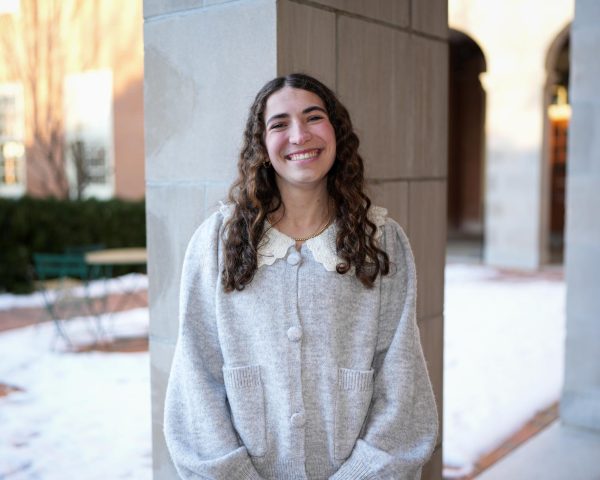The Wake Forest community gathered to hear David Brooks, a conservative columnist and author, express his takes on the current state of our social and political world. The Face to Face speaker forum was held on Thursday, Feb. 27 in Wait Chapel.
The best-selling author, op-ed columnist for the New York Times and recurring commentator on PBS NewsHour focuses on addressing the value of community and bettering the inner self, along with commenting on our current political climate. He has written six books, with many bestsellers among them.
The event was moderated by senior Steven Cayea and master’s of management student Nasra Deria, who are both members of Wake Forest’s Leadership and Character program.
“Moderating the event was an exciting and enriching experience,” Deria said. “Working alongside the very intelligent Leadership and Character scholars as we prepared the questions was both challenging and rewarding. David Brooks himself was attentive, quick-witted, warm, and intentional with his responses. Meeting him backstage beforehand eased my nerves and allowed the conversation on stage to flow nicely. It was truly an experience I’ll never forget.”
Brooks used humor and storytelling to keep students engaged as he gave advice on entering the professional world and finding one’s passions. Brooks urged students to find a career that makes them feel alive, rather than something that is a mere occupation.
“Find the four moments you are happiest and see if you can draw a thematic line between them,” Brooks said.
He then explained the importance of taking risks that lead to greater things.
“I call it identity capital– doing something unusual that people will ask you about in every job interview throughout your life,” Brooks said. “That speaks to taking risks.”
He continued: “My mission is to widen my horizons and do something crazy, so that if [a job] ever [asks] me for something I’ll know I can handle it.”
Alongside advice about external success and achievements, Brooks expressed thoughts about how to cultivate your best inner self. Related to his book “The Second Mountain,” Brooks said that over the next 10 years, students will make four big commitments in their lives — to a vocation, a philosophy or faith, a community and a family. These big commitments, though rewarding, may lead to pain and hardship.
“Moments of suffering interrupt your life and remind you that you aren’t who you thought you were,” Brooks said. “In these moments of pain you see yourself more accurately. You have to stay in the pain to see what it has to teach you.”
Though he is an experienced journalist and author, Brooks explained that the first six months working for the New York Times was the hardest period of his entire career.
“I had never been hated on that scale before,” Brooks said. “When I was hired, my boss said I was the most conservative we think our readers could stand.”
Though he is a longtime conservative, Brooks shared negative opinions on the current state of American politics with President Donald Trump.
“[Conservatives] believe in the power of the institution, the importance of moral norms, in human sin, so therefore we have created constitutions, habits, rituals to build up the better side of our nature,” Brooks said. “When I look at a lot of what Trump is doing, it seems like the opposite. I just don’t think conservative is the same thing as being a republican anymore.”
Brooks’ honesty about his views on the political world stood out to students like junior Nick Mauro.
“My favorite part was how it’s super relevant to today’s culture,” Mauro said. “[Brooks] described his personal beliefs about being a conservative and how it doesn’t exactly align with a sort of political ideology nowadays.”
Wake Forest Medical School student Riyan Deria came to the event even though she was unfamiliar with Brooks, but she was impressed.
“He told some really interesting stories, and I liked hearing his perspective especially because I like listening to people who might not align with my views,” Deria said. “It was easy to be receptive to what he was saying.”
Mauro expressed similar sentiments.
“He has different opinions and takes a very balanced approach to providing commentary,” Mauro said. “In the program for leadership and character there’s definitely this value on a diversity of perspective and a curiosity to learn different types of thinking. Brooks obviously brings that.”










